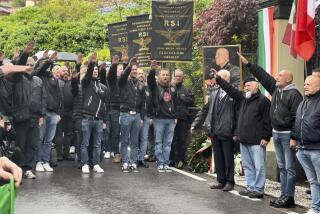Protests Mark 10th Anniversary of Tito’s Death
- Share via
BELGRADE, Yugoslavia — Police clubbed demonstrators Friday and hauled some off to jail during protests over observing the 10th anniversary of the death of Josip Tito, the founding father of Communist Yugoslavia.
Police also broke into a school and detained pupils who ripped Tito pictures off the wall and destroyed them.
The incidents took place as factory sirens wailed at 3:05 p.m.--a signal to mark the hour of Tito’s death on May 4, 1980, at age 87.
Passers-by mostly ignored the sirens and teen-agers continued enjoying their ice cream. In previous years, Yugoslavs stood still and observed a minute of silence.
This time, police fought members of the Serbian Radical Party in Belgrade, arresting people who kept yelling, “Down with the Communists! Out of Serbia!” Shouts against hard-line Serbian Communist leader Slobodan Milosevic also were heard.
No official word came on the number of arrests or possible injuries, but witnesses said some police action was brutal.
Protesters tore up and threw in the air old 500-dinar bank notes bearing Tito’s image--now almost worthless in the wake of 2,500% inflation.
Police forced a photographer taking pictures of demonstrators being pushed into a police van to expose his film to light.
Demonstrators were seen pulling off a Marshal Tito street sign in downtown Belgrade. The main street of every city, town and village in Yugoslavia is named after Tito.
About 200 Radical Party members and other Yugoslavs opposed to continuing public veneration of Tito unfurled a Serbian flag in front of Parliament and carried a placard reading, “Exterminate the Evil” (communism).
For almost 45 years, Tito has been officially revered for his role in fighting the Nazis in World War II, for his break with Moscow in 1948, and for guiding Yugoslavia into the nonaligned movement in the 1960s.
But now, many Yugoslavs feel their current ethnic, economic and political troubles took root during Tito’s rule. They blame the weak, decentralized leadership system he bequeathed for many of the problems.
Parliament is expected to decide soon to annul a law that makes it a criminal offense to criticize Tito or his policies.
More to Read
Sign up for Essential California
The most important California stories and recommendations in your inbox every morning.
You may occasionally receive promotional content from the Los Angeles Times.










